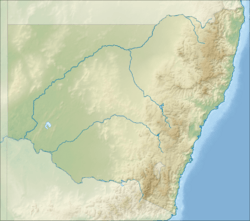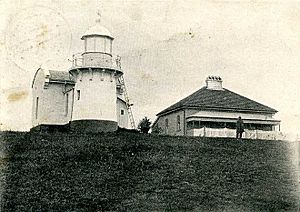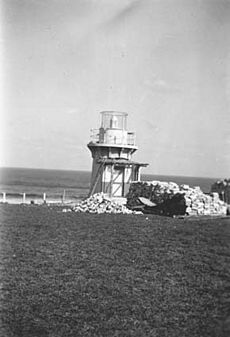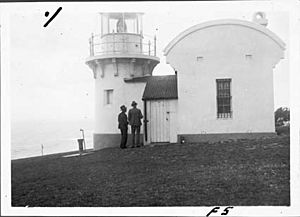Richmond River Light facts for kids
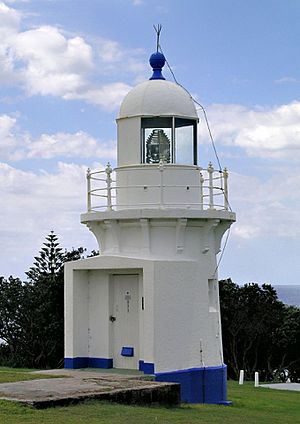 |
|
| Richmond River Light, 2006 | |
|
|
|
| Location | Ballina New South Wales Australia |
|---|---|
| Coordinates | 28°52′1.31″S 153°35′30.49″E / 28.8670306°S 153.5918028°E |
| Year first constructed | 1866 |
| Year first lit | 1880 |
| Automated | 1920 |
| Construction | stone tower |
| Tower shape | cylindrical tower with balcony and lantern |
| Markings / pattern | white tower and lantern |
| Height | 25 feet (7.6 m) |
| Focal height | 115 feet (35 m) |
| Original lens | 4th order catadioptric |
| Current lens | 2nd order Chance Brothers Fresnel lens |
| Intensity | 28,000 cd |
| Range | 14 nautical miles (26 km; 16 mi) |
| Characteristic | Fl (4) W 16s. |
| Admiralty number | K2834 |
| NGA number | 111-5888 |
| ARLHS number | AUS-142 |
Richmond River Light, also known as Ballina Head Light and Ballina Light, is an active lighthouse located at Ballina Head, a headland in Ballina, New South Wales, Australia. The headland is at the northern side of the entrance to the Richmond River. It used to serve to guide ships into the river port and is used also serves as a leading light into the river, together with a steamer's masthead lantern with a 200 mm lens which is raised on a wooden structure 30 metres (98 ft) from it.
Contents
History
The station was established with a temporary light that was installed in 1866 from plans by James Barnet, at the same time of the installation of the Clarence River Light.
The current lighthouse is one of five lighthouses of similar design designed and built by James Barnet in 1878–80, the other four being Fingal Head Light, Clarence River Light (now demolished), Tacking Point Lighthouse and Crowdy Head Light. A tender was called in 1878, it was built in 1879 and lit in 1880.
The apparatus was a fixed light 4th order catadioptric apparatus of less than 1000 cd and was visible for 12 nautical miles (22 km; 14 mi). It was powered by colza oil. As the light was operated in conjunction with a nearby pilot station, only one light keeper was required.
In 1920 the light was converted to acetylene gas and automated. In November 1940, the annexe and the porch connected to the lighthouse were demolished.
The light was electrified in the 1960s. The current light source is a 28,000 cd, 1,000 Watt 120 Volt tungsten-halogen lamp, and the power source is the Mains with a Battery standby. It shows a light characteristic of four white flashes every 16 s (Fl.(4)W. 16s)
Structure
The tower is very similar in design to the other four lighthouses. It is circular, 6 feet (1.8 m) in diameter (internally), with walls tapering from 19 inches (480 mm) at the bottom to 14 inches (360 mm) at the top. The tower is constructed of stone, and cement rendered, and painted white. On top of the tower there is an oversailing bluestone platform, supported at by twelve bluestone corbels, at about 12 feet (3.7 m) above the ground. The platform can be reached by an iron stair inside the tower. Around the perimeter of the platform is a metal handrail. The platform is topped by the simple metal dome which houses the optical apparatus.
Originally the lighthouse had a porch, rectangular annexe for the duty room and oil store. These were all demolished in November 1940. A one-story keeper's house is still present at the premises.
Site operation
The light is currently operated by Roads and Maritime Services (formerly NSW Maritime) and the site is managed by the New South Wales Department of Lands.
Visiting
The site is open to the public and accessible, but the tower is closed.


